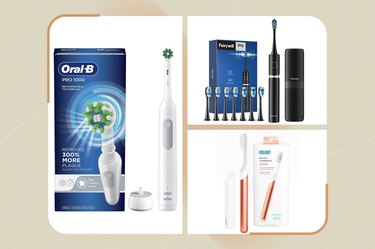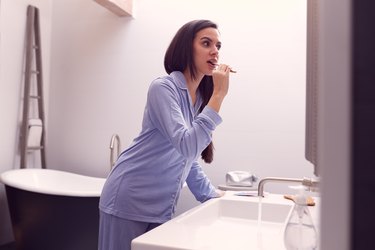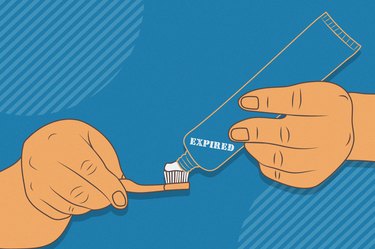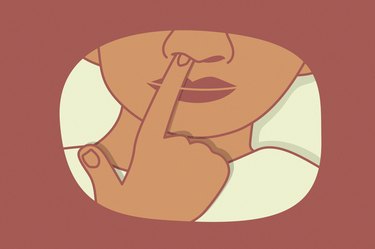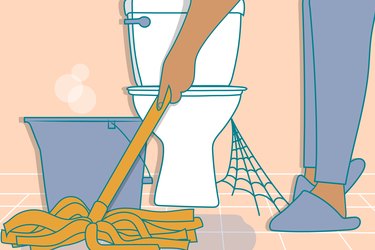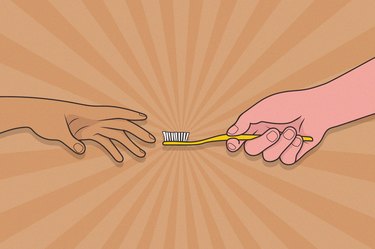
We've all been caught without a toothbrush. You're vacationing at a house rental, camping or staying at a friend's or date's place and forget one. And yet, you don't want to go to bed without freshening up your mouth. So, you grab for someone else's toothbrush and give your pearly whites a little scrub. Better.
But is it?
Video of the Day
Video of the Day
We'll cut to the chase. It's really bad — really bad — to share a toothbrush. "This is something I would never, ever recommend," Anna Murphy, DDS, a dentist at Nova Dental Practice in Herndon, Virginia, tells LIVESTRONG.com.
"Absolutely not," says Corina Layton, a Savannah, Georgia-based registered dental hygienist.
And: "There's never a good time to share a toothbrush with anybody," says Kami Hoss, DDS, founder of The Super Dentists and author of If Your Mouth Could Talk.
Here's why when it comes to your toothbrush, sharing is best avoided.
It Messes With Your Oral Microbiome
Your mouth is filled with billions of microbes (e.g., bacteria, fungi), collectively called the oral microbiome, Dr. Hoss says. Every person's mix of microbes is different — he likens this to a fingerprint — and "in a healthy mouth, this microbiome is in balance," he says.
Your toothbrush has a really intimate relationship with your unique oral microbiome.
Brushing your teeth causes millions of microbes to stick to the bristles, Dr. Hoss says. As you brush, you're kicking up debris in your mouth — and keep in mind, you might be sick with a virus or your gums may bleed, he says. This all goes onto the toothbrush. That means if you use someone else's toothbrush, it'll transfer this whole oral party into your mouth, not to mention you'll be scrubbing those contaminated bristles into your own gums.
As a result, it's possible to catch virus or introduce microbes associated with cavities and gum disease into your own mouth, Dr. Hoss says.
It doesn't mean that if you share a toothbrush you'll develop a cavity or gum disease. And if you're thinking, I've done this before and nothing bad has ever happened, we totally understand where you're coming from. The development of cavities and gum disease is multifactorial and much of it depends on factors like your underlying immune system and your own oral microbiome, Dr. Hoss says.
But still, it's not worth taking this risk. These types of bad bacteria are opportunistic — they really would love to grow and flourish in your mouth. Best not to give them that chance. And by this way, this advice applies whether you're sharing a toothbrush with a family member or a friend, and whether you're doing it once or regularly.
Kissing someone, particularly making out, absolutely exposes you to someone's saliva and the viruses that can be lurking there. That's why you stay away from your partner when they're hacking or sniffling.
Toothbrushing, however, goes the extra mile.
"Bacteria hides underneath your gums, and a toothbrush's bristles will stir up the periodontal bacteria in your mouth," Layton says. In addition, someone's gums may bleed when they brush (if that's you, talk to your dentist — the American Dental Association says it's a sign of gingivitis) and brushing works to break up plaque.
Even a very passionate kiss is not going to disrupt plaque and bring about bleeding.
What if You Don’t Have a Toothbrush?
There are a few things you can do to get your mouth semi-clean without reaching for someone else's toothbrush, Dr. Murphy says:
- Put a small amount of toothpaste on your finger and pretend your (clean!) finger is the toothbrush.
- Use a clean washcloth to "gently rub the plaque off your teeth," Dr. Murphy says.
- Swish with a mouthwash.
- Use floss.
Ideally, you would be using your own toothpaste tube or floss as you do this (maybe keep one in your bag wherever you go for backup), as Dr. Hoss doesn't recommend sharing any oral care products.
More Oral Care Best Practices
Also important for good health: Make sure that you're storing toothbrushes separately.
In one October 2020 study on household oral healthcare habits during COVID-19, published in BMC Oral Health, just 3 percent of people shared a toothbrush but 64 percent used the same container to hold everyone's brushes, something that could also facilitate cross-contamination of the virus.
If you do get sick with any virus (COVID-19, influenza or an everyday cold), toss your old toothbrush and start over with a clean, fresh one.
After using a toothbrush, rinse it with water to clean off any toothpaste or debris, then store it upright so it can air dry, which makes it less likely to grow bacteria than using a toothbrush cover, Dr. Murphy says.
It's bad. It's gross. Three out of three dental professionals we talked advised not sharing a toothbrush under any circumstances.
Is this an emergency? If you are experiencing serious medical symptoms, please see the National Library of Medicine’s list of signs you need emergency medical attention or call 911.

